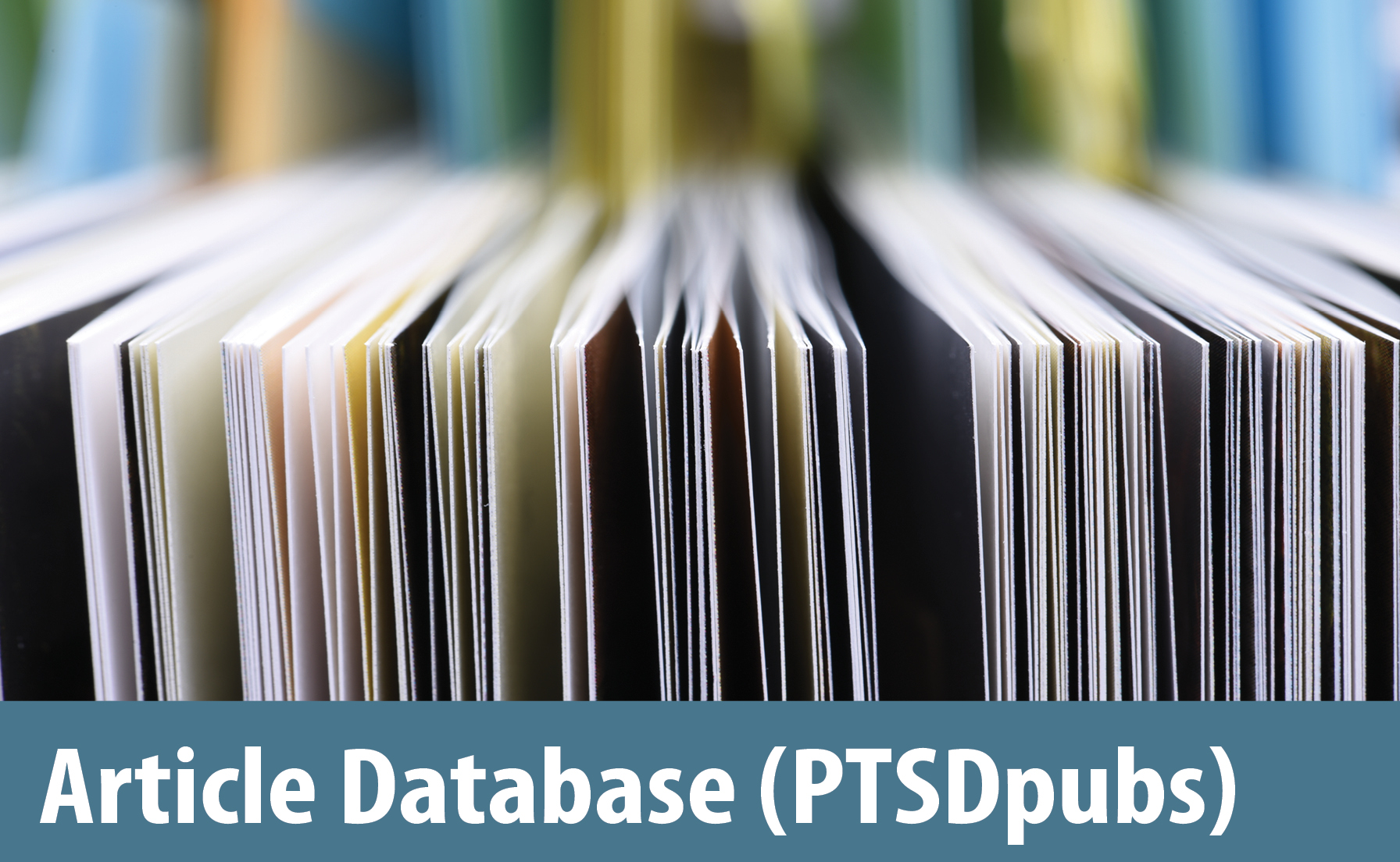PTSD: National Center for PTSD
Providing Mental Health Care for Those Who Experienced Military Sexual Trauma
Providing Mental Health Care for Those Who Experienced Military Sexual Trauma
Military sexual trauma, or MST, refers to sexual harassment or sexual assault that occurs during an individual's military service. Not everyone who experiences MST will face long-term health consequences but experiencing MST does increase the likelihood of mental and physical health problems and readjustment challenges. Risk and protective factors specific to the individual and that individual's environment influence the intensity, duration and trajectory of health consequences. Learn more about the types of experiences that can be considered MST, how frequently MST occurs, and common risk and protective factors that influence health and well-being following MST at Military Sexual Trauma.
In This Article
Challenges to Help Seeking
As in civilian contexts of sexual trauma, the majority of those who experience MST do not make official reports to authorities about their experiences (1,2). They may be understandably reluctant to disclose to others or seek help because they anticipate adverse reactions to their reports, particularly from formal helping systems (e.g., legal systems, medical systems). These negative reactions can include being disbelieved, minimizing the severity of the sexual trauma experience, failing to act against the perpetrator, or retaliating against the survivor.
Sexual trauma survivors from historically marginalized backgrounds may be at even higher risk of unhelpful, invalidating reactions from formal helping systems. People of color, as well as others with less societal or institutional power such as LGBTQ+ individuals, may be disinclined to seek assistance from formal sources of help because they have reasonable concerns that their reports will be taken less seriously. They also may fear being discharged from the military or experiencing other forms of retaliation if they report their experiences or seek other forms of help. Men, despite not being a historically marginalized group, may experience unique challenges around help-seeking after MST due to stigma and stereotypical messaging about sex roles and masculinity.
When those who experience MST do reach out for help, the responses they receive can have a powerful impact on their post-trauma recovery. For example, receiving invalidating or stigmatizing responses from legal, medical, or other sources of formal help can compound mental health difficulties for individuals after MST, increasing symptoms of PTSD, feelings of isolation, perceptions of self-blame, and other challenges (3,4). Also, negative reactions from formal sources of help may affect survivors' willingness to seek out treatment or disclose their experiences to others, such as family and friends. This is problematic, as social support is one of the strongest predictors of recovery from trauma (5). In contrast, positive, supportive responses from formal and informal sources of support can help mitigate some of the potential consequences of MST by reducing the survivor's sense of helplessness, isolation, self-blame and general emotional distress. Positive reporting experiences, such as feeling that the incident has been addressed, can even have long-term benefits, such as improved functioning and fewer PTSD symptoms (2).
Screening and Assessment
Screening all Veterans for a history of sexual harassment and assault during military service is good clinical practice given the high proportion of Veterans who have experienced MST. Universal screening also mitigates the potential for sexual trauma survivors to be reluctant to disclose information about their trauma histories unless asked directly. Identifying a history of MST early in treatment can also positively affect both treatment planning and the dynamics of treatment over time.
Accurate and effective screening for MST requires adherence to several important principles (6):
- Creating a context that facilitates disclosure is a necessary first step. Screening should take place in a private setting, without risk of interruptions. Ensure that your speech is unhurried and has a supportive tone. Make good eye contact and ensure that your nonverbal behavior conveys your comfort with the topic and the sense that this is an important issue.
- Next, help Veterans feel at ease by normalizing the screening process by saying something like, "Stressful life experiences like the ones I'm going to ask about next unfortunately occur so frequently that I ask all my clients whether they experienced them." When asking the screening questions use behaviorally-based language that avoids technical or legal language (e.g., avoid "rape" or "sexual assault") and negative phrasing (e.g., "nothing like that has ever happened to you, right?"). The questions used as part of the VA's universal MST screening program provide an example of this approach: (1) When you were in the military, did you ever receive unwanted sexual attention you found threatening (for example, touching, cornering, pressure for sexual favors, sexual texts or online messages, or inappropriate verbal remarks, etc.)? (2) Did you have sexual contact against your will or when you were unable to say no (for example, after being forced or threatened or to avoid other consequences)?
- Finally, respond supportively regardless of the Veteran's answer to screening questions. This can include providing support, education and connection to resources for Veterans who respond "yes" and leaving the door open for future conversations if the Veteran responds "no" (e.g., "I'm glad to hear that. Since those experiences can be tough to talk about, I wanted to ask about them specifically so that you know it's ok for us to talk about difficult topics.").
For mental health professionals who provide care for those who have experienced MST, conducting a solid functional assessment is an important starting place for delivering effective treatment. When the index trauma event is MST, this assessment should include gathering basic information about the MST experience that may be associated with subsequent symptom complexity (e.g., was the experience sexual harassment, sexual assault or both?; a single incident or an ongoing series of events?; what support was received from others at the time?). The type and course of treatment will determine if and when a more detailed assessment of the specifics of an MST experience is necessary.
Although PTSD is one of the most common mental health diagnoses among individuals who experienced MST, not everyone who experiences MST will go on to develop PTSD. As such, diagnostic assessment should include clear elaboration of any PTSD symptoms, but also a focus on any additional relevant psychiatric and physical health comorbidities.
Finally, understanding the extent to which an individual is dissatisfied with their functioning in important life domains (e.g., relationships, work/school, housing/finances, health management) will provide important information for the focus of care.
Treatment
Although the consequences of MST can be severe and complex, there are effective treatments that can significantly reduce psychological symptoms and improve quality of life after MST. Given the range of potential impacts that can be associated with experiences of MST, decisions about specific treatment approaches will depend on the specific symptoms and functional concerns reported by an individual. However, given that PTSD is the diagnosis most closely associated with experiences of MST, a solid knowledge of evidence-based treatments for PTSD is often key to delivering successful care to those who have experienced MST.
Two cognitive-behavioral treatments identified as having the highest level of research support, Prolonged Exposure (PE) and Cognitive Processing Therapy (CPT), were originally developed for and have been rigorously tested among civilian and military sexual trauma survivors with PTSD (7-10). Given their strong supporting evidence, these trauma-focused therapies should be considered as a first-choice treatment for those who have PTSD related to MST when consistent with patients' therapeutic goals. Treatment is likely to be most effective when providers focus therapy on themes and issues that may be more common among those who experienced MST. For example, MST survivors diagnosed with PTSD may struggle with interpersonal relationships and issues related to trust, self-blame, and shame more—or in somewhat different ways—than Veterans with PTSD related to combat or other forms of trauma.
Depending on an individual's preferences and stage of recovery, other treatment approaches may be more appropriate. For example, many individuals who experienced MST can benefit from psychoeducation about MST and common reactions, which can help them to understand their own reactions and behaviors and feel less alone. Additionally, some may wish to prioritize developing more adaptive skills or responses to help them cope with and more effectively problem-solve day-to-day stressors. For even more information, providers in and out of VA can visit VA's MST webpage for health care providers.
What Resources Can I Recommend to Individuals Who Experienced MST?
Explore and share these resources with people who experienced MST, those who support them, and colleagues who would like to learn more:
- VA's MST website has information about free MST-related health care services in VA, downloadable resources with information about MST and recovery, and a provider-specific page with more training resources. VA providers can locate additional resources on the MST Resource Homepage on VAs SharePoint.
- Those who want to access MST-related care at VA can contact the MST Coordinator at their nearest VA Medical Center, speak with their existing VA health care provider, or contact their local Vet Center.
- The Beyond MST mobile app is a free, secure, trauma-sensitive resource created specifically to support the health and well-being of people who experienced MST. It has over 30 specialized tools and other features to help those who use it cope with challenges, set self-care goals, track their recovery progress and find hope. It's also a great way for professionals to learn more about MST and VA's MST-related services. No account is needed, and any personal information entered in the app is not shared with anyone, including VA.
- The National Center for PTSD's AboutFace website features real stories of Veterans who experienced PTSD, their family members and VA clinicians. Visit the AboutFace MST page to watch and listen to Veterans who experienced MST discuss the impacts of the experience and their recovery. There is also guidance for how to integrate the videos into treatment discussions on the Using AboutFace page.
- Make the Connection is an online VA resource that connects Veterans and those who support them with information, resources and stories of hope and mental health recovery. Visit the Make the Connection MST page to watch videos of Veterans sharing their stories of recovering from MST. The Resources for Clinicians page has tips and videos on how this resource can support professionals in their work.
- The Department of Defense (DoD) Safe Helpline is a hotline and online resource for current service members affected by sexual assault during their military service. It is a completely anonymous, confidential, 24/7 resource for help and information, including content about reporting options and resources, anytime, anywhere.
References
- Campbell, R. (2008). The psychological impact of rape victims. American Psychologist, 63(8), 702-717. https://doi.org/10.1037/0003-066X.63.8.702
- Bell, M. E., Street, A. E., & Stafford, J. (2014). Victims' psychosocial well-being after reporting sexual harassment in the military. Journal of Trauma and Dissociation, 15(2), 133-152. https://doi.org/10.1080/15299732.2014.867563
- Andresen, F. J., Monteith, L. M., Kugler, J., Cruz, R. A., & Blais, R. K. (2018). Institutional betrayal following military sexual trauma is associated with more severe depression and specific posttraumatic stress disorder symptom clusters. Journal of Clinical Psychology, 75(7), 1305-1319. https://doi.org/10.1002/jclp.22773
- Monteith, L. L., Bahraini, N. H., Matarazzo, B. B., Soberay, K. A. & Smith, C. P. (2016). Perceptions of institutional betrayal predict suicidal self-directed violence among Veterans exposed to military sexual trauma. Journal of Clinical Psychology, 72(7), 743-755. https://doi.org/10.1002/jclp.22292
- Wagner, A. C., Monson, C. M., & Hart, T. L. (2016) Understanding social factors in the context of trauma: Implications for measurement and intervention. Journal of Aggression, Maltreatment & Trauma, 25(8), 831-853, https://doi.org/10.1080/10926771.2016.1152341
- Street, A.E., Shin, M.H., Marchany, K.E., McCaughey, V.K., Bell, M.E. & Hamilton, A.B (2019). Veterans' perspectives on military sexual trauma-related communication with VHA providers. Psychological Services, 18(2), 249-259. https://doi.org/10.1037/ser0000395
- Khan, A. J., Holder, N., Li, Y., Shiner, B., Madden, E., Seal, K., Neylan, T. C., & Maguen, S. (2020). How do gender and military sexual trauma impact PTSD symptoms in Cognitive Processing Therapy and Prolonged Exposure? Journal of Psychiatric Research, 130, 89-96. https://doi.org/10.1016/j.jpsychires.2020.06.025
- Schnurr, P. P., Friedman, M. J., Engel, C. C., Foa, E. B., Shea, M. T., Chow, B. K., Resick, P. A., Thurston, V., Orsillo, S. M., Haug, R., Turner, C., & Bernardy, N. (2007). Cognitive behavioral therapy for posttraumatic stress disorder in women. JAMA, 297(8), 820-830. https://doi.org/10.1001/jama.297.8.820
- Resick, P. A., & Schnicke, M. K. (1992). Cognitive Processing Therapy for sexual assault victims. Journal of Consulting and Clinical Psychology, 60(5), 748-756. https://doi.org/10.1037/0022-006X.60.5.748
- Foa, E. B., & Rothbaum, B. O. (1998). Treating the trauma of rape: Cognitive-behavioral therapy for PTSD. Guilford Press.
You May Also Be Interested In

Continuing Education Online Courses
Learn from expert researchers and earn free Continuing Education (CE) credits.

























